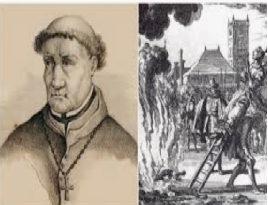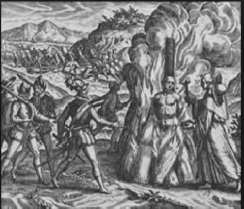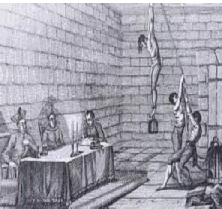|
PART 1 T O P I C |
|
|
|
|
|
|
|
|
|
|
|
|
|
|
|
|
|
|
|
CLICK BUTTON |
|
|
|
|
|
|
|
|
|
|
|
|
|
THE INQUISITION AND THE |
|
|
|
|
JewishWikipedia.info
Many reasons are given as to why this happened. The 17th century saw a decrease in the severity of punishments probably due to a mixture of the following factors:
- Protestantism became a greater threat to Catholicism than Judaism
- It was seen as more a political arm of the throne than as a defender of the faith
- The venality of many inquisitors became public knowledge
- The declining value of confiscated goods by the tribunals meant the Inquisition ceased to be so profitable. Fewer penitents were sent to autos de fé in the eighteenth and early nineteenth centuries, given short jail sentences. Fines did not include the total confiscation of the prisoner's property.
- New ideas such as those of the of Rousseau
SPAIN
Encyclopedia.com
The Inquisition declined with the Spanish empire in the seventeenth century. As the tribunals pulled back from their ambitious program of vigilance, caseloads and revenue fell. The tribunals focused on cases of Portuguese conversos living in Spain, witchcraft and superstition, and censorship. In the eighteenth century the Inquisition could not stop the slow spread of Enlightenment ideas to Spain, and the country's intellectuals increasingly began to see the tribunals as out of step with the times. With the Napoleonic invasion of 1808, the courts were suppressed for the first time, at the hands of French officials and Spanish liberals. Conservative nationalists, however, fighting for independence and the return of Ferdinand VII (ruled 1808, 1814–1833), claimed that the court was the guardian of Spanish identity and morals. The Inquisition was restored without powers in 1814, only to undergo a lingering death between 1820 and 1834.
The Holy Office was suppressed for the final time by official decree in 1834, but historians have argued about its significance ever since. In the nineteenth century Protestant historians and Spanish liberals blamed Spain's backwardness on the Inquisition and the Catholic Church, which were seen as having terrorized the country, suppressed the basic rights of freedom of speech and religion, and retarded economic growth and scientific thought. In the twentieth century, with the advent of murderous anti-Semitic and totalitarian regimes, the focus shifted to understanding the Inquisition's role in the long history of the persecution of Jews and repression of entire populations. Under the pro-Catholic dictatorship of Francisco Franco (1892–1975; ruled 1939–1975), censorship prevented Spaniards from freely evaluating the Inquisition's legacy, and in the 1970s the most objective work was carried out by foreign historians interested in the new social history and history of mentalités. After the collapse of the regime in 1975, Spaniards in the 1980s and 1990s joined in a renaissance of Inquisition studies to understand their country's complex history. The large body of scholarship produced since 1975 has considerably modified and fleshed out understandings of the Holy Office, which has come to be seen as considerably less monolithic and ruthless than was previously thought.
Columbia University, Alison Krueger, Department of Spanish and Portuguese
In 1598 Philip II died and his son, Philip III is crowned king. Philip III inherited a troubled nation and a faltering economy. His reign marked an important period of economic decadence and decline of the Spanish state. At this time, much of the Spanish wealth still came from silver mines in the New World, but control over this wealth channel was increasingly precarious. The military powers of other nations, such as England, threatened the transportation of silver. The fall in silver imports caused inflation and a crisis of (economic) confidence, and the attempts made to remedy these problems with new coinage only make matters worse. While the aristocracy and Catholic Church pay no taxes, peasants were expected to pay very high taxes on their land. This tax structure de-incentivized peasant agricultural production, and many peasants decided to abandon the rural life and moved to urban areas (which were weakened by disease and plagues). Agricultural production also lagged behind other European countries due to Spain’s lack of initiative in implementing important reforms, such as irrigation measures. Finally, luxury goods were purchased abroad, sending money out of the country rather than stimulating industry within Spain. We might say that there was very little incentive in Spain to produce – either agricultural crops or quality goods that might serve to develop an export economy.
Despite these economic problems, many court advisors continued to support aggressive foreign policy and military campaigns, even though Spain was no longer able to afford such initiatives.
PORTUGAL f
following the Liberal Revolution of 1820, the "General Extraordinary and Constituent Courts of the Portuguese Nation" abolished the Portuguese inquisition in 1821. The Marquis of Pombal was an 18th century Portuguese statesman. He was the Secretary of the State of the Kingdom of Portugal and the Algarves (the equivalent to a today's Prime Minister) to Joseph I of Portugal from 1750 to 1777. He distinguished himself by his swift action following the 1755 Lisbon earthquake and policies to improve Portugal’s economy. He weakened the grip of the Inquisition and had the Jesuits expelled. (See JEWS AND THE MARQUIS OF POMBAL))
Italy saw the restoration of the Pope as the ruler of the Papal States in 1814 and so the activity of the Papal States Inquisition continued on until the mid-19th century. The last arrest was of Edgardo Mortara (1858–1870).
Goa abolished in 1812, Mexico, Peru and Cartatgena in 1820 .
Former Spanish colonies in the Americas. The wars of independence of concluded with the abolition of the Inquisition in every quarter of Hispanic America between 1813 and 1825.
The Inquisition had lasted 600 years.
To control the Inquisition In 1542 the Pope created the Supreme Sacred Congregation of the Roman and Universal Inquisition, was established "to maintain and defend the integrity of the faith and to examine and proscribe errors and false doctrines". It served as the final court of appeal in trials of heresy and played an important part of the Counter-Reformation.
It was renamed the Supreme Sacred Congregation of the Holy Office in 1904. It is often informally called the Holy Office (e.g. Italian: Sant'Uffizio and Spanish: Santo Oficio ).
It became the Sacred Congregation for the Doctrine of the Faith (SCDF) in 1965.
In 1983 the adjective Sacred was dropped from the names of all Curial Congregations, and so it became the Congregation for the Doctrine of the Faith.
See also ‘The Popes Against the Jews’ by David Kertzer
THE
INCREDIBLE
STORY OF THE JEWISH PEOPLE



WHY THE INQUISITION DECLINED
